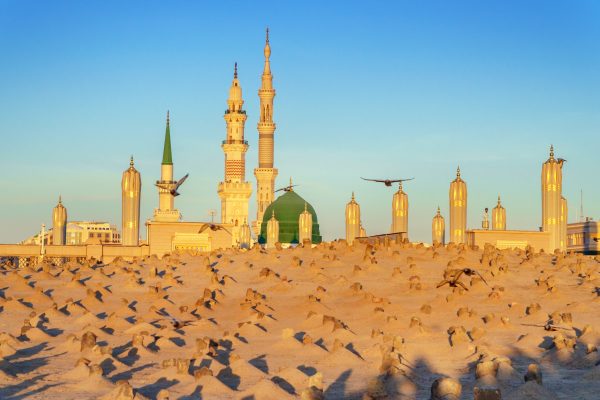In the Name of Allah, the Most Kind, the Most Merciful.
The call for the Muslims to gather at their annual conference and perform the pilgrimage to the House of Allah (swt) is drawing closer. Established by the Prophet Abraham (a) when he was commanded to call mankind to the Hajj, when yet there was no sign of people or infrastructure, he was promised:
They will flock to you walking or on every lean camel (mode of transport); they will come from every distant location” (Qur’an 22:27)
Hajj has a distinguished philosophy and set of higher aims, as alluded to before calling it the ‘annual conference’ of the Muslim world, where they are supposed to meet and make ties, keep each other aware of their circumstances, exchange ideas, resolve issues and depart with stronger bonds than when they arrived.
The Qur’an alludes to certain gains that are supposed to be achieved from the Hajj (or any other pilgrimage such as ‘Umrah’ or visitation to the great saintly figures of Islam). For example:
1) لِيَشْهَدُوا مَنَافِعَ لَهُمْ “So that they might experience much that shall be of benefit to them” (22:28). This envelopes all the spiritual as well as material blessings, and encompasses not only the individual and social interests, but also the political, economical and ethical benefits that may be achieved.
This is just as the hadith says: والحَجَّ تَقْوِيَةً لِلّدينِ “The Hajj is a means of strengthening the religion.”
2) وَتَزَوَّدُوا فَإِنَّ خَيْرَ الزَّادِ التَّقْوَىٰ “And take provision for indeed the best provision is God-consciousness” (2:197). This verse refers to the provisions of increased ‘Aql, strength of intentions and the spirit of piety.
Have we ever truly completed and understood the acts of Hajj?
In light of this second verse advising the pilgrims to take their provisions, here are seven short pieces of advice on preparing for Hajj and what provisions need to be put in place in advance of starting this journey of a lifetime.
1) Purify your wealth and property from the outstanding rights placed upon it. These may be religious dues to Allah (swt) like Zakaat or Khums, a Nadhr (oath) or Kaffarah (expiation of a sin), or what you owe to people such as loans. Return to people whatever you have borrowed, forgotten about or usurped be it as small as a book. If that is not possible then pay the equivalent amount in charity on their behalf and seek forgiveness from Allah (swt).
As the hadith says: حُسْنُ الاستِدراكِ عُنْوانُ الصَّلاحِ “Proper rectification [of one’s mistakes] is the symbol of righteousness.”
2) Look into the best person to make your friend on your travels. You will be sharing so much proximate space from airports to buses to rooms. This time is precious and you don’t want to waste it with people who will be talking nonsense or complaining. As the hadith mentions: خَيْرُ الاِخْتِيار مُوادَّةُ الأخْيارِ “The best choice is making friends with the virtuous.”
3) Start to learn about the profundities of Hajj. Generally, the laws will be explained to you by your guide or scholar. Immerse yourself in the cognition of the virtues of the House of Allah, the personality of the Prophet Muhammad (s), the etiquettes of travel, the deeper meanings of each action you will be performing, and the effects on your behaviour it is supposed to bring about. Reflect on the challenges you expect to face on Hajj and how you plan to navigate those to maximise your time there.
4) Ensure your health is able to meet the physical demands of Hajj. If you need to start walking or running daily, bettering your diet or ordering medicines, do so in advance. Not only does your body have a right upon you, others have a right not get sick or delayed unnecessarily by you!
5) Write your will and testimony. As the Qur’an states, “Prescribed for you when death approaches [any] one of you if he leaves wealth [is that he should make] a bequest” (2:180). This is a sign of submission, preparedness to meet with Allah (swt), and ensuring your actions are always in accordance to the Shari’ah.
6) Visit or make time for those from your family and friends also departing for Hajj and see them off/depart from them in good spirit hoping to meet them at the House of Allah (swt) or return back to them well and spiritually enlivened. To know their du’a and convey it for them and to discuss what changes you wish to see upon your return will ensure the transition back into your community will be one which can utilise the insights and blessings gained on Hajj.
As the hadith says: صِلَةُ الأرحامِ تُثْمِرُ الأمْوالَ، وتُنْسِيُ فِي الآجالِ “Keeping ties with near relatives produces wealth and delays death.”
7) Fortify your determination on reforming yourself and depart from your home placing your trust in Allah (swt), under the shade of the Qur’an and having put some Sadaqah (charity) for your safety. Emphasise to yourself that this journey is to build a new life, for the one who purifies himself by bathing does not return straight to the dirt they were playing in before for.
These seven pieces of advice are particular for the preparation of Hajj, whose efforts are dedicated to ensuring the provisions they are going with allows them to meet Allah (swt) in the best of ways. As the hadith says: أفْضَلُ المُسْلِمينَ إسْلاماً مَنْ كانَ هَمُّهُ لأُخْراهُ ، وَ اعْتَدَلَ خَوْفُهُ وَرَجاهُ “The best of all Muslims in practicing Islam is he whose efforts are for his Hereafter and whose fear of Allah is balanced with his hope in His mercy.”





